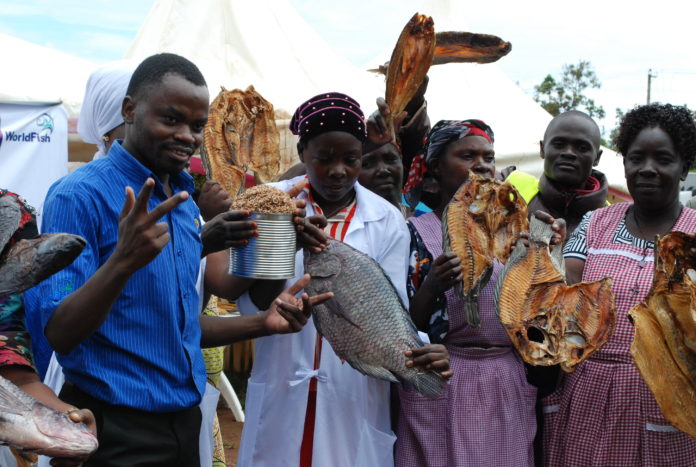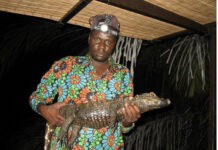By Ann Mikia
Nairobi, Kenya: Human activities around and in Lake Victoria such as farming on the shores, overfishing, and use of wrong fishing are slowly but surely killing biodiversity in the lake, an expert has warned.
Dr. Mark Olokotum, a Uganda-based Aquatic diversity scholar, said things are however changing for the better as locals have started appreciating the importance of conserving the lake and the lives it supports.
“After sensitization of area residents living around the lake we are witnessing a change as they have now resorted to using fishing nets with big holes, which enable them to spare the small fish until they mature,” said Dr. Olokotum during the Fifth African Conference of Science Journalists.
According to the International Union for Conservation of Nature (IUCN), illegal, unregulated, and unreported (IUU) fishing is posing a severe threat to the survival of fish species in Lake Victoria.
Lake Victoria is the second largest freshwater body in the world and the largest lake in Africa.
It is the chief reservoir of the River Nile and is shared by the three East African countries of Tanzania, Uganda, and Kenya.
A 2018 IUCN report warns that some 76 percent of fish species in the lake currently face extinction. This includes crustaceans like shrimps and crabs, which are important to local livelihoods.
Experts describe fish as a renewable resource and one of the national resources that can rejuvenate the economy of East African countries.

Fish, therefore, needs to be protected to grow and it was this realization that made Uganda come up with a raft of measures to save small fish to grow.
The Uganda fisheries inspector Mugawi Innocent says the country has enforced the management of fisheries resources for the last 10 years. In 2017, Mr. Innocent said, the Ugandan army was ordered to help the Ministry of Agriculture, Animal Husbandry and Fisheries curb illegal fishing to increase the fish biomass because the fish factories were almost closing down.
Lieutenant Cannon Dick Kaija is the commanding officer for the Fisheries Unit in Uganda.
In the enforcement of the illegal gear law, he says they check whether the boats measure 28ft and above and also monitor whether the right boats have registration according to the district of the landing site it operates from.
“We also check if the fishermen are using undersize nets, undersize hooks, and prohibited nets such as monofilament and trawl nets. Fishermen operating in the lake commercially also ought to have the right licenses; namely, fishing license, trade license, and transport license,” said Kaija.
The enforcement of the illegal fishing law by the Ugandan army seems like a double-edged sword, though.
It has helped protect the Nile perch in Ugandan waters if the fish factories that were almost closing down but are back into the business is anything to go by.
On the other hand, the fishermen complain about the inhumane mishandling they have encountered at the hands of the law enforcers.
The enforcement of the law happens in both Kenya and Uganda.
At Port Victoria in Kenya, Stella Simiyu narrates how her husband, who is a fisherman, was arrested by the Ugandan fishermen in August 2021.
“When they got him in the lake fishing, they first beat him up, forcing him to jump into the lake but they got him out and went with him. We were called by other fishermen who informed us that he was beaten badly and taken to Uganda,” narrates Ms. Simiyu.
The Beach Management Unit Chairman of Matolo in Sigulu, Uganda, Osbert Okeyo, confirms that many fishermen have died due to fear of arrest.
He says they prefer drowning to being arrested by the Ugandan army. He says some fishermen live with injuries, while others have lost property because of illegal fishing.
“In Uganda, they want fishermen to use big boats from 28ft and over and for the nets to be 5 inches plus for tilapia and for the hooks from 9 inches and above. In Uganda, so many forces police the lake – Uganda People Defense Force (UPDF), Uganda Revenue Authority, and the Fisheries Department,” says Mr. Okeyo.
The case of dwindling fish in Lake Victoria is likely to affect many livelihoods.
Timothy Odede, the director of fisheries in Busia County, is against the use of excessive force in enforcing the law.
“The status of the fishermen is not the middle-class and if you arrest the last man, the next to be born will still go to the lake. We, therefore, need to be more creative and sensitive in dealing with the fishing problem,” he said.
Mr. Odede said the biggest headache is to reduce the fishermen and fishing gear in order to increase the biomass in the lake.
He however prefers a different approach. “It’s more expensive to police the lake than investing in the lives of the affected people. If you look at the battalion of soldiers in the lake in terms of their allowances, fuel, and logistics, I think it would be more cost-effective to invest in alternatives instead of management by the gun,” he said.
The excessive use of force by the Ugandan army has instilled fear and injuries in fishermen they have apprehended. It hasn’t curbed illegal fishing either.
Dr. Olokotum confirms that the enforcement against illegal fishing in Lake Victoria was only effective for two years from 2017-to 2019 but old habits started creeping back.
MESHA Features.














